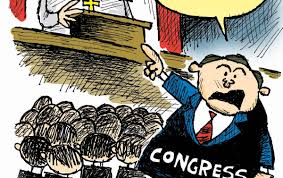
Amidst the thunderous cannon fire and bloody battlefields of the Civil War, a quieter, yet equally potent struggle raged – the battle for hearts and minds. From towering pulpits, ministers wielded their words like mighty swords, issuing fervent sermons that stirred emotions and shaped the course of the nation’s destiny. Fueled by religious zeal and political fervor, these ”pulpits of power” became formidable platforms for shaping public opinion, mobilizing support, and undermining the opposition.As the nation teetered on the brink of collapse, sermons became potent weapons in the arsenal of war, their influence echoing through the battle-scarred land.
– Pulpits of Pulpit Power
Pulpits of Pulpit Power
Throughout the Civil War, pulpits served as powerful platforms for political preaching.Ministers of both the North and the South used their sermons to rally support for their side. Northern preachers argued that the war was a righteous struggle against slavery,while Southern preachers maintained the war was a defense of states’ rights. These sermons where frequently enough highly partisan and helped to shape public opinion on the war and its outcome.
– The Politicization of Preaching
The Northern Defense: A Pulpit’s Fight Against the Confederate Cause
Northern abolitionist preachers took advantage of their pulpits in a calculated strategy to denounce slavery and mobilize support for the Union cause. By the mid-1850s, a network of over 200 abolitionist ministers used their public platforms to thunder against the evils of slavery and the sin of secession. They urged their congregations to provide material support to anti-slavery societies and to champion the cause of abolitionism.Their fiery sermons swayed public opinion in the North, energizing those who believed that preserving the Union was not only a political but a moral imperative.
– Preachers Prevail in Politics
During the Civil War, the pulpit became a powerful platform for political preaching. Ministers of all denominations used their sermons to rally support for their respective causes. Some of the most influential preachers of the era included Henry Ward Beecher,a leading voice for the Union,and Robert Lewis Dabney,a prominent Confederate minister. These preachers not only shaped public opinion but also played a direct role in shaping the course of the war. Beecher’s sermons, for example, were instrumental in galvanizing support for the Union cause in the North.Dabney’s sermons, on the other hand, helped to justify the Confederacy’s secession from the Union.
– Historical Outlook in a Modern Context
The Civil War transformed religious life in unprecedented ways,as evidenced by the increasingly political nature of sermons. Preachers once focused on moral issues like sin and salvation now found themselves compelled to address the pressing social and political questions surrounding the conflict. this politicization of the pulpit reflected the changing role of religion in American society, as the lines between church and state became increasingly blurred. Sermons became a powerful tool for shaping opinion and influencing political decisions.Radical abolitionists like Henry Ward Beecher used their pulpits to denounce slavery and advocate for the Union cause, while Southern ministers like Robert Lewis Dabney defended the Confederacy and its peculiar institution. By intertwining religious language with political rhetoric,evangelical Protestant preachers mobilized their followers and helped to shape the ideological landscape of the Civil War.
In Retrospect
As the echoes of the Civil War recede into the annals of history, the pulpits of power stand as enduring testaments to the intertwined nature of faith and politics in that tumultuous era. From the fiery sermons of abolitionists to the justifications of slavery from proslavery preachers, the power of the pulpit played a pivotal role in shaping the conflict and its aftermath.
While the profound sermons of the war era may have faded with time, their legacy lives on in the ongoing conversations about faith, politics, and social justice. The pulpits of power continue to serve as reminders that the intersection of these spheres is ever-evolving, and that the search for truth and righteousness will always be a central theme in the human experience.
